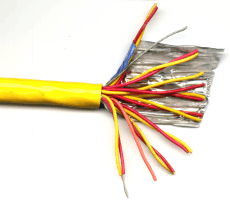A HOLISTIC APPROACH & STRATEGIC VISION FOR PROCESS SOLUTIONS
PVC EXTRUDED
PVC Extruded Sensor Wire offers exceptional durability, chemical resistance, and temperature stability for a wide range of industrial applications. The PVC insulation provides long-lasting protection in harsh environments, ensuring reliable performance for temperature sensors, thermocouples, and more. Ideal for applications requiring accurate and consistent temperature sensing, this wire is designed for versatility and robustness in demanding conditions.
Example Applications: Permanent Sensor Fabrication, Laboratories, Test Facilties, Short-run Extension Leads Symbols:
† = Available as a UL construction. Prefix construction code with a “U”
§ = Also available as a multi-pair construction
1 = Two singles twisted together without a jacket
2 = In multi-pair construction, outer shield only
3 = This construction code applies only to multi-pair cable
PP: The least expensive jacketed extension wire insulation available. The PVC individual color-coded conductors are insulated with 15 mils (nominal) of PVC, then parallel conductors are given a 20 mil PVC jacket (35 mils for UL). The Jacket is easily stripped for separation of insulated conductors for assembly.
| Compounds | Shields /Twisting | Temp. Rating (Continuous) | Notes |
|
Singles: Jacket: |
None | v105°C (220 °F) |
† 35 mil jacket |
Comparison to Other Constructions:
Abrasion Resistance – Good
Chemical Resistance – Fair
Moisture Resistance – Good
Relative Cost – Low
PTWP: The least expensive twisted and jacketed extension wire insulation available. The PVC individual color-coded conductors are insulated with 15 mils (nominal) of PVC, twisted together, then conductor pair(s) are given a 20 mil PVC jacket (35 mils for UL). The jacket is easily stripped for separation of insulated conductors for assembly.
| Compounds | Shields /Twisting | Temp. Rating (Continuous) | Notes |
|
Singles: Jacket: |
No Shields Singles Twisted |
v105°C (220 °F) |
§ |
Comparison to Other Constructions:
Abrasion Resistance – Good
Chemical Resistance – Fair
Moisture Resistance – Fair
Relative Cost – Low
PAAP: This construction is the same as the PAP construction, with the addition of an aluminum/Mylar tape and drain wire over each single pair in the construction in addition to the overall shield. This provides isolation for each separate pair in the construction and eliminates internal and external noise in the circuit.
| Compounds | Shields /Twisting | Temp. Rating (Continuous) | Notes |
|
Singles: Jacket: |
Single and Overall Shield Singles Twisted |
v105°C (220 °F) |
†,§,3 |
Comparison to Other Constructions:
Abrasion Resistance – Good
Chemical Resistance – Fair
Moisture Resistance – Good
Relative Cost – Low
PTW:The least expensive extension wire insulation available. The PVC individual color-coded conductors are insulated with 15 mils (nominal) of PVC, then twisted together.
| Compounds | Shields /Twisting | Temp. Rating (Continuous) | Notes |
|
Singles:
No Jacket |
No Shields Singles Twisted |
v105°C (220 °F) |
1 |
Comparison to Other Constructions:
Abrasion Resistance – Good
Chemical Resistance – Fair
Moisture Resistance – Fair
Relative Cost – Low
PAP: Single & Multipair cables with an overall shield are constructed by insulating the single conductors with PVC. One conductor of each pair is numbered and twisted with its counterpart. The twisted pairs are cabled with an insulated copper communications wire and the entire construction is wrapped with an aluminum/Mylar tape shield. A copper drain wire is applied under the extruded PVC jacket.
| Compounds | Shields /Twisting | Temp. Rating (Continuous) | Notes |
|
Singles:
Jacket: |
Overall Shield Singles Twisted |
v105°C (220 °F) |
†,§,2 |
Comparison to Other Constructions:
Abrasion Resistance – Good
Chemical Resistance – Fair
Moisture Resistance – Good
Relative Cost – Low
Mineral Insulated (MGO) Sensors
Industrial Thermocouples
Plastics & Packaging
Temperature Transmitters
Resistance Temperature Detectors
Thermowells
Custom Designed sensor




